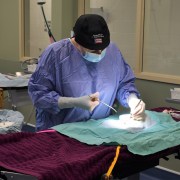February is Spay/Neuter Awareness Month which celebrates the importance of animal population control and encourages families to ensure their dogs and cats are spayed or neutered. Each year, more than 6 million dogs and cats wind up in animal shelters in the U.S. as a result of unplanned litters, reinforcing the importance of spaying or neutering our furry family members.
According to the ASPCA, here are the 5 additional benefits to spaying and neutering:
- Your Pet Will Love a Longer, Healthier Life
Spaying prevents uterine infections and significantly decreases the prevalence of breast tumors, which are malignant or cancerous in about 50 percent of dogs and 90 percent of cats. Spaying your pet before her first heat offers the best protection from these diseases. Neutering your male companion prevents testicular cancer and some prostate problems.
- Your Spayed Female Pet Won’t Go Into Heat
While cycles can vary, female felines usually go into heat four to five days every three weeks during the breeding season. In an effort to attract mates, they’ll yowl and urinate more frequently—sometimes all over the house!
- Your Dog Will Be Less Likely to Run Away From Home
An intact animal will do just about anything to find a mate, including finding creative ways to escape from the house. Once free to roam, he risks injury in traffic and fights with other animals.
- Your Unneutered Male May Mark and Mount
Unneutered dogs and cats are more likely to mark their territory by spraying strong-smelling urine all over the house. An unneutered dog is also more likely to mount other dogs, people, and inanimate objects. These concerns as well as some aggression problems may be avoided by early neutering.
- Spaying/Neutering Your Pets is Highly Cost-Effective
The cost of your pet’s spay/neuter surgery is far less than the cost of having and caring for a litter.
“There are so many benefits to spaying and neutering your animals. I always recommend working with your veterinarian to find the right time to schedule the procedure based on your pet’s specific health circumstance,” says Larimer Humane Society Supervising Veterinarian Dr. Lindsey Gapstur. Make sure to contact your veterinarian to discuss and/or schedule your pet’s spay/neuter appointment and encourage your family and friends to do the same.









